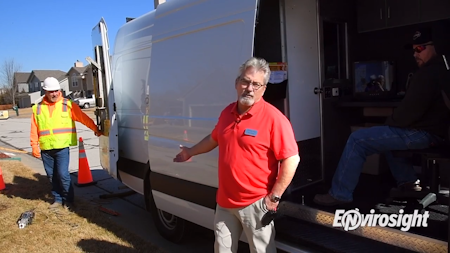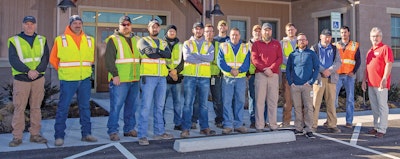To remain proactive and spur their master improvement plan, the city of Liberty, Missouri, found a novel method to simplify rehab and construction.
The city approached Kelson and Kenneth Kerns about the possibility of buying the assets of the long-standing family construction business their father started in the 1970s. As part of the deal, the Kerns brothers would join Liberty as full-time employees, taking management positions overseeing the construction division. The timing was perfect.
“They approached us about buying our equipment — pipelaying equipment, shoring, and everything needed to start construction for the city of Liberty — and we sold all of it to the city,” says Kelson, who heads the wastewater end of the construction division. “Then we became employees of the city of Liberty.”
A difficult choice
The decision to sell the family business wasn’t easy, but the small company had done work for the city for years and joining the Liberty utilities department turned out to be an ideal scenario for the Kerns brothers.
In the early 2000s, Liberty began work on master plans for their water and wastewater systems. When the utilities department was separated from Public Works in 2011, management had the idea of adding a construction division for water and wastewater projects.
They approached the Kerns and made them an offer in fall 2011.
“It was kind of the right timing for both of us because the construction industry at that time was just very competitive,” Kelson says.
The Kerns say that their parents were considering retiring from the business at that time anyway, and it provided a future for them to continue working in the industry without the stress of keeping the business afloat.
“This made it easier for their transition to retirement,” Kelson says. “And then we have something to do, as far as a career in construction.”
With a specialty in underground construction, the business had done many projects for Liberty over the years.
“In all the years that I’ve been here, they were always our go-to guys in case of emergency,” says Brent Ellison, longtime Liberty employee and current assistant director for utilities, operations, and construction. “We worked hand in hand with them, even though they really didn’t work per se under the city’s control.”
Nonetheless, a series of misfortunes dominated the 2000s for the Kerns. A tornado destroyed much of their facilities and equipment in 2003, which they were still recovering from when the 2008 recession compounded their troubles.
“It was hard to get back up, recover from that,” says Kenneth, water construction manager for Liberty. “That made a double-whammy on the business, so when the city approached us about coming to work for them and starting the construction division, we jumped at it.”
Under the city’s employment, they were even able to build a nice new office in their old facility, now owned by the city. After the space was ready, the division started simply, with just the brothers and a single laborer, doing rehab work and smaller projects within the master plan.
“There’s peace of mind knowing you’re going to have work. When you’re in the private sector, you depend on bidding jobs and getting them. And we’ve got security as far as having work to do and having a retirement plan,” Kenneth says. “Less stress, definitely.”
Adjusting on the fly
If there were any doubts among other city departments as to the need for an internal construction division, they were quickly quelled.
“We immediately started going to work. We had one major project actually start in the spring: several thousand feet of waterline we put outside of town in an area that didn’t have city water,” Kelson says. “That was our first project right out of the gate.”
Liberty was settled early in the 1800s and became the county seat in 1822, even though it wasn’t incorporated until 1829. Much of the city still uses its original underground systems and actually has honorary membership to the Cast Iron Pipe Century Club, meaning a significant amount of pipe is at least 100 years old.
“Liberty’s a pretty old town and has some issues,” says Jason Thomas, collections division manager. “We try to walk a line of maintenance without breaking any of the pipe further, and then we’ve also experienced a little bit of growth, so there’s a fair amount of new pipe in town too, but we still deal with pipes that are a hundred years old.”
The combination of maintenance, rehabilitation and new construction keeps the Kerns and their new division busy.
“We kind of hit the ground running here that spring, and it’s grown since then,” Kenneth says. “We haven’t stopped working on different projects that the city comes up with: sewer projects, water projects. … We don’t have a loss for work.”
Some large projects are still contracted out, but having the construction division available for both rehab and smaller capital improvements is faster, generally cheaper, and frees up other city resources to focus on projects that will go to bid.
“Having them in-house allows us to schedule jobs a lot sooner and a lot more cost-effectively,” Thomas says.
Help flows both ways, too, as Thomas and his collections crews can step in with a hydroexcavator or other assistance when necessary.
“It’s great actually — just having an extra set of hands if we need help, or even on bigger projects, if we go help them,” Thomas says. “It gives our guys a little more experience too on some other stuff that they normally wouldn’t be exposed to.”
Proof is in the projects
A job that started as a simple point repair project exemplifies the benefit of a staff construction crew. The sewer line in question collapsed and ended in a full line replacement, from manhole to manhole.
The Kerns were on the job immediately, instead of the city having to wait potentially days or weeks to begin the repair.
“Just to have them on staff to come out and start working on that right away — instead of having to solicit bids and go who knows how long before we could get it worked on — I’d say easily weeks, saving time. And then some of the other jobs, I mean, it could be months,” Thomas says. “When you hire out a company, you have to get an engineering firm and then go through a lot of other hoops that we don’t have to go through.”
An upcoming job this spring is another great example: “If you had to get a contractor, you’d probably have to have an engineer, and with the bidding process, it’d be a year or so before this would get done,” Kenneth says. “I think we can get it done this spring and be back on the road to the next job.”
In addition to saving time, the construction division saves money on a number of factors — most notably the fact that profits aren’t an issue.
“It’s more cost-effective. You don’t have to pay prevailing wage, of course we don’t charge a profit, when we do our jobs, it’s materials and our labor,” Kelson says. “I’ve got a spreadsheet going on this, where we’ve saved quite a sum of money — three-quarters of a million dollars over the past five or six years — on doing this in-house.”
Benefits for all
The problems Liberty faces are common to many small cities around the country — aging infrastructure and providing for growth at the same time, with close competition between lack of funds and lack of manpower.
An entire construction division may seem out of reach for many municipalities, but this town, at least, makes it look pretty easy.
“Personally, for me, I’m pretty happy here.” Kenneth says. “The city’s been good to us. It’s satisfying to know that we’re saving the city money every time we go out and work.”
It has worked out on both ends, helping the city to maintain a progressive work schedule with water and wastewater systems and keeping a pair of experienced managers thriving in the industry.
“Now that we have them on, it has definitely been a godsend,” Thomas says.
Avoid the bidding wars
Bidding projects can often be a mixed bag for utilities: Sure, it generally encourages competitive pricing, but it takes time and comes with a lot of hoops to jump through, often including multiple subcontractors and significant organizational efforts.
However, the city of Liberty has found a way to avoid that hassle by creating a construction division within their utility. While not unheard of, Liberty took a creative approach to their construction division.
Starting a new division is no simple endeavor, but by essentially folding a longtime contractor into the city, purchasing assets, and hiring on the former owners as managers, the division found its feet quickly.
“Actually it was very smooth. I was very surprised,” says Brent Ellison, assistant director of utilities, operations, and construction for Liberty. “I think that was due to the fact that we had worked with and beside them on numerous occasions in the past.”











